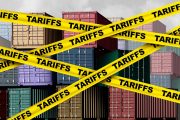
The Trump administration sent to Congress on Tuesday a list of changes to U.S. law that will be dictated by the United States, Mexico, and Canada (USMCA) trade deal, illustrating how multilateral trade deals reduce American national sovereignty. The submission of required changes to American law is also a demonstration of how, over the years, Congress has surrendered much of its constitutional authority over international trade to the executive branch.
Under Trade Promotion Authority (TPA), a president can negotiate trade deals on his own and then send them to Congress, where members are not allowed to make any changes, but can only vote the entire deal up or down. Acting in concert with recent U.S. presidents, Congress has increasingly given up much of its constitutional authority to make laws for America — all in the name of “free trade.”
With the Trump administration now pushing Congress to adopt its new multilateral trade agreement with Mexico and Canada to replace NAFTA, this trend seems destined to continue, unless Americans become more aware of what is happening and rise up to stop it.
During his successful presidential campaign, candidate Trump demanded that NAFTA be repealed, but it is becoming increasingly obvious that the USMCA simply continues the trend of America losing control of much of its own economy.
According to the aforementioned list of changes to U.S. law, delivered to Congress by U.S. Trade Representative Robert Lighthizer, USMCA would change the “rules of origin” for both automobiles and automobile parts as to what tariff rates can be imposed when these products are imported.
Senate Finance Committee Chairman Chuck Grassley (R-Iowa) received the list and expressed caution concerning the proposals: “This is an important step required under U.S. law to implement the new trade deal with Mexico and Canada. Congress has to carefully consider the agreement and work out the details before it can be ratified.”
House Speaker Nancy Pelosi (D-Calif.) has said that Mexico would first have to reform its labor laws before the deal could be acceptable. Senator Marco Rubio (R-Florida) has voiced reservations, expressing concern that it would damage the Florida agricultural industry.
On the other hand, there appears to be some movement among Democrats, who have not been as favorable toward trade deals as Republicans. Only 28 Democrats voted for trade promotion authority in 2015, even under Democratic president Barack Obama. Representative Don Beyer (D-Va.), a leader of the pro-trade “New Democrats,” was one of those 28, and he said, “Structurally, I would love to be part of moving our Democratic Party” more to the free-trade position.
Perhaps a reason for the increased support among Democrats for trade deals is that they have a better chance of advancing their liberal agenda that way than through more direct congressional action. As Beyer explained, “To the extent that USMCA built some of the progress that was made in the [Trans-Pacific Partnership] negotiations, specifically on labor enforcement, environmental enforcement … that’s something to be celebrated.”
In other words, Congress can pass trade deals that implement a progressive agenda in areas such as environmental laws without taking a direct vote on those issues. That way, members of Congress can hope to avoid the ire of their constituents for making unpopular votes — they can just say it was in the trade deal.
This is a pattern that has developed over the past few decades. Congress delegates its authority to the executive and judicial branches. Instead of taking responsibility themselves, they can blame some federal judge for implementing a policy, arguing they would not have voted that way. Or, they can condemn the president or bureaucrats in the executive branch for a policy unpopular in their state or congressional district. In the end, members of Congress do not have to make a recorded vote on controversial subjects, and can show up and draw their breaths and their salaries.
Senator Pat Toomey (R-Pa.) touched on this, with remarks about President Trump’s unilateral imposition of tariffs. While Congress gave the office of the presidency this authority to impose tariffs without a congressional vote, many in Congress are now questioning the wisdom of such delegation of authority on tariffs — largely because they don’t like how Trump has used that authority.
“The Constitution is totally unambiguous,” Senator Toomey said. “This [the setting of tariff rates] is a congressional responsibility.” Toomey and Representative Mike Gallagher (R-Wis.) have co-authored the Congressional Trade Authority Act, which would require the approval of Congress before any new tariffs could be imposed under the previous law that Congress enacted in 1962, which gives the president the ability to unilaterally set tariff rates in the guise of national security. Toomey told Politico’s Morning Trade, “I think most Republican senators recognize that we’ve been delegating our authority over to the executive branch for decades in a lot of areas, and trade very much being one of them. Y’know, it’s time we take that responsibility that we’re supposed to take.”
While they are at it, they need to strip the president of the power of “fast track,” given to that office under TPA. This is clearly a violation of the intent of the Founders in the Constitution, who gave power over trade legislation to Congress.
In addition, these trade deals are clearly treaties, and thus they should require a two-thirds vote of the Senate. Perhaps Senator Toomey, or some other member of Congress, should raise that issue as well.
Image: Kameleon007 via iStock / Getty Images Plus





